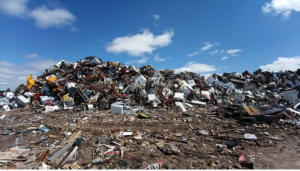Three Common Problems With Landfills And How To Resolve Them

Landfills are not pretty sites. Along with being unpleasant to look at, they also pose health and environmental concerns that need to be addressed. We will look at three common problems landfills can cause, as well as measures we can take to address those problems.
Problem 1: Toxins
Many different materials that find their way into a landfill have toxins that eventually get released and get absorbed into the groundwater and soil. The emitted toxins are incredibly hazardous to the environment and can linger for many years. Think about electronics like computers and televisions that get thrown away. Items like these have arsenic, lead, acids, and other harmful substances that can do serious damage to the earth, and to ourselves.
To help tackle the toxin problem, there are landfills being designed with synthetic membranes that prevent toxins like mercury from getting into soil and groundwater. The toxins end up getting redirected through a series of pipes and sent into a sewer system that allows them to be retained, incinerated, or turned into fertilizer.
Problem 2: Leachate
Leachate is a liquid created from water filters that travel through broken-down landfill waste, causing it to pick up toxins. The rain that falls on top of landfills is the greatest contributor to the creation of leachate. Other causes can stem from groundwater that enters landfills. As liquid travels through a landfill and gathers decomposed water components, chemical reactions begin to happen. This ultimately creates a sort of toxic leachate “cocktail” of sorts.
Leachate can be treated in a couple of different ways. One such method is a more biological approach. It uses filters to get rid of nitrogen and other biological compounds from any poisoned wastewater. There is also a chemical-physical approach available. Wet oxidation processes are a viable method if it’s possible to oxidize all of the organic compounds. This can include activated carbon absorption, flocculation, ion exchange, and precipitation.
Problem 3: Greenhouse Gas
Organic materials that find their way into landfills, such as food scraps and yard waste, usually get compacted. The main problem with this is that this process removes oxygen, causing these items to break down anaerobically. Over time, this will create methane, which is 20 times more potent than carbon dioxide. Methane is dangerous to release into the environment and is even flammable, which makes it highly volatile in large concentrations.
New landfills are lined with a membrane with the purpose of catching methane in its liquid state before it can get into the air. This membrane doesn’t catch 100% of the methane though. There are some treatment processes available that can reduce the production of methane.
- Open Window Or Tunnel Composting: This uses aerobic digestion as a means of decomposing organic material without producing methane gas.
- In-vessel Composting: This aerobic treatment is done in a closed container to facilitate the breaking down of waste by micro=organisms.
WB Waste Wants To Help
WB Waste is a waste services holding company. Our focus is on delivering environmentally friendly waste solutions through our family of waste collection, recycling, processing, and transportation companies. Our clients are from all sectors, Government, Business, and Residential across all industries: hospitality, construction, education, transportation, and many more.
Visit our website here if you’re interested in our services, and follow us on Facebook, Twitter, and Linkedin.